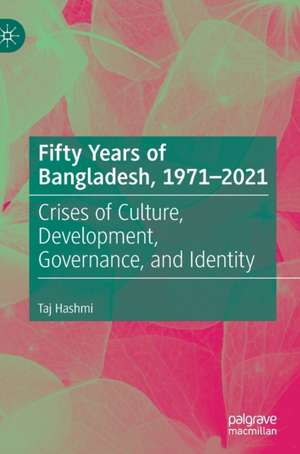Fifty Years of Bangladesh, 1971-2021: Crises of Culture, Development, Governance, and Identity
Autor Taj Hashmien Limba Engleză Hardback – 23 apr 2022
| Toate formatele și edițiile | Preț | Express |
|---|---|---|
| Paperback (1) | 783.68 lei 6-8 săpt. | |
| Springer International Publishing – 23 apr 2023 | 783.68 lei 6-8 săpt. | |
| Hardback (1) | 757.64 lei 18-23 zile | +74.67 lei 6-12 zile |
| Springer International Publishing – 23 apr 2022 | 757.64 lei 18-23 zile | +74.67 lei 6-12 zile |
Preț: 757.64 lei
Preț vechi: 832.57 lei
-9% Nou
Puncte Express: 1136
Preț estimativ în valută:
144.98€ • 149.57$ • 120.98£
144.98€ • 149.57$ • 120.98£
Carte disponibilă
Livrare economică 03-08 martie
Livrare express 19-25 februarie pentru 84.66 lei
Preluare comenzi: 021 569.72.76
Specificații
ISBN-13: 9783030971571
ISBN-10: 3030971570
Pagini: 388
Ilustrații: XIX, 388 p.
Dimensiuni: 148 x 210 mm
Greutate: 0.64 kg
Ediția:1st ed. 2022
Editura: Springer International Publishing
Colecția Palgrave Macmillan
Locul publicării:Cham, Switzerland
ISBN-10: 3030971570
Pagini: 388
Ilustrații: XIX, 388 p.
Dimensiuni: 148 x 210 mm
Greutate: 0.64 kg
Ediția:1st ed. 2022
Editura: Springer International Publishing
Colecția Palgrave Macmillan
Locul publicării:Cham, Switzerland
Cuprins
1. Introduction.- 2. Why Bangladesh? A Pre-History up to the Rise of Mujib, 1757-1963.- 3. The Rise of Sheikh Mujibur Rahman, 1963-1971.- 4. The Decline and Fall of Sheikh Mujibur Rahman,1971-1975.- 5.Trial and Error, Hope and Despair: Bangladesh Under Zia and Ershad, 1975-1990.- 6. “Dynastic Democracy” Under the “Battling Begums”,1991-2021.- 7. Problematic Integration of Minorities: A Case Study of Bihari Muslims.- 8. The Crisis of Identity: Bengali, Islamic, or Islamist Extremism?.- 9. “Culture Matters”: Towards Understanding the Crisis of Culture in Bangladesh.- 10. Conclusions.
Notă biografică
Taj Hashmi is retired Professor of History and Security Studies at the Asia-Pacific Center for Security Studies (APCSS), USA.
Textul de pe ultima copertă
This book, the first historical sociology of its kind concerning Bangladesh, examines the country's what-went-wrong-syndrome during the first fifty years of its existence, 1971-2021. The work is an exception to the traditional studies on modern and contemporary Bangladesh. The study is also a post-history of united Pakistan. Busting several myths, it sheds light on many known and unknown facts about the history, politics, society, and culture of the country. Besides being a twice-born country – liberated twice, from the British in 1947 and from West Pakistanis in 1971 – it is also an artificial entity suffering from acute crises of culture, development, governance, and identity. Hashmi attributes the culture and identity crises to the demographic byproducts of bad governance. In addition to being overpopulated, Bangladesh is also resource-poor and has one of the most unskilled populations, largely lumpen elements and peasants. According to Marx, these peoplerepresent “the unchanging remnants of the past”. The second round of independence empowered these lumpen classes, who suffer from an identity crisis and never learn the art of governance. The proliferation of pseudo-history about liberation has further divided the polity between the two warring tribes who only glorify their respective idols, Mujib and Zia. Pre-political and pre-capitalist peasants’ / lumpen elements’ lack of mutual trust and respect have further plagued Bangladesh, turning it into one of the least governable, corrupt, and inefficient countries. It is essential to replace the pre-capitalist order of the country run by multiple lumpen classes with capitalist and inclusive institutions.
Taj Hashmi is retired Professor of History and Security Studies at the Asia-Pacific Center for Security Studies (APCSS), USA.
Taj Hashmi is retired Professor of History and Security Studies at the Asia-Pacific Center for Security Studies (APCSS), USA.
Caracteristici
Provides the first historical sociology of Bangladesh Elucidates major problems of bad governance in light of sociology, anthropology, and political science Provides a post-history of united Pakistan
